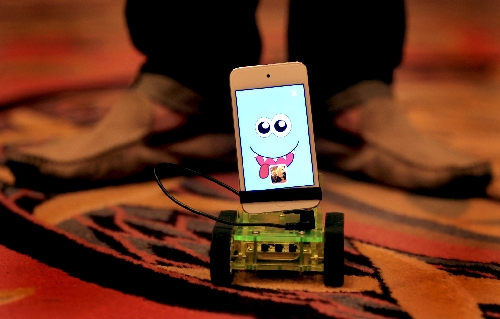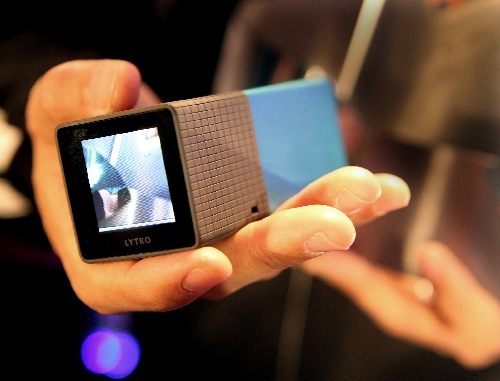Las Vegas tech company’s robots grab CES spotlight
LG, Nokia and Samsung are accustomed to the spotlight of the International Consumer Electronics Show, which ended Friday in Las Vegas, but the startups showcased in the convention's Eureka Park zone were savoring their first taste of fame.
For the startup section's lone Las Vegas-based company, robot manufacturer Romotive, CES delivered on its promise -- face time with plenty of potential customers and a parade of meetings with high-powered tech execs.
"We've just been swamped this entire week, by people who love the idea, people who are buying robots or people who are helping us in tangible ways to make the business more valuable," Romotive co-founder Keller Rinaudo said.
The Romotive team met with representatives from Apple, General Electric and Best Buy during the week. The company was featured by tech blogs Wired and Engadget. Hundreds of people visited the Eureka Park booth, and some 100 ordered robots of their own.
Romotive designs and produces a small robot, called Romo, which functions using a smartphone or iPod as its brain. Users control the robot, seeing through its "eyes,'' with another smartphone, tablet or laptop computer. A robot costs $99 and is sold through the company's website, www.romotive.com.
Romotive, which has offices in the downtown Ogden high-rise tower, had some help from friends in high places during its eight-month journey from conception to CES exhibitor.
A trio of boyhood friends from Phoenix founded the company. Harvard grad Rinaudo reunited with robot enthusiasts Peter Seid and Phu Nguyen after college and moved to Las Vegas, inspired by Zappos CEO Tony Hsieh's vision for downtown and the startup community springing up around Zappos and its affiliates.
"There's a real longing for community here that doesn't exist in San Francisco," Rinaudo said. "Whenever you create a tech conference or tech get-together it's an instant success, no matter what it is. There are all these people here who are looking for things to do in this space."
Romotive's $18,000 in seed money came from TechStars, a national startup accelerator that accepts about 1 percent of companies that apply, TechStars founder and CEO David Cohen said.
The company is now profitable, but Rinaudo said he and his partners want to go global by September.
They raised a round of investment money late last year -- Rinaudo declined to say how much -- from Hsieh, Stanford University, Sequoia Capital, Cohen and TechStars Managing Director David Tisch.
Those well-known investors helped Romotive secure a footing at CES.
The convention offered Romotive plenty of perks, including a 10 foot-by-10 foot booth for $1,000, a discount from the usual $5,000, in exchange for participating in the show's first startup tech zone. More than 100 other startups also landed discounted spots in the Eureka Park zone.
"Not a lot of small companies have the opportunity to be on that worldwide stage. It's for companies that are trying to gain footing in the consumer electronics industry," Consumer Electronics Association spokeswoman Allison Fried said. "Some of them aren't actually finalized, but that was the idea behind Eureka Park -- that "Eureka!" moment."
The show also offered Romotive the chance to meet its customers for the first time.
"Being able to talk to those people and see how they buy and when they buy is really valuable," Rinaudo said. "It's something that's surprisingly hard to get when you're selling online. You never see your customers, so you really don't have any idea who they are or what they're about or what's important to them."
Rinaudo discovered that the company's target market skewed older than expected.
Romotive thought younger people would embrace the robots, but Rinaudo learned that many older buyers were giving the small 'bots to their children and grandchildren.
Rinaudo said Romotive's customers mainly use Romo for entertainment or as a conversation starter. But when the company launches its server in February, the robot's uses will expand, he said.
"Once it's controlled over the Internet, you can control a robot in Beijing. That opens up a lot of really cool applications in terms of telepresence, monitoring your home while you're gone, or even just attending conferences or being able to see places, exotic places or significant places that you would not otherwise get the chance to see," Rinaudo said.
You could even send Romo to tour the CES show floor without leaving your couch.
Now that the convention has wrapped, the Romotive team will focus on expanding the company from 10 people to 20, fulfilling 2,000 robot orders by February. After that, the partners will figure out how to mass-produce Romo and create new ways to use the robot.
"We believe strongly in building a community around Romo," Rinaudo said. "The idea of having a chance to build something from scratch, a blank slate, just build our own tribe in Las Vegas, was incredibly attractive to us."
Contact reporter Caitlin McGarry at
cmcgarry@reviewjournal.com or 702-387-5273.






















